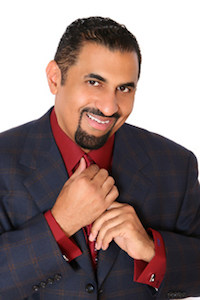Music Career Finder
Survey Start
Program Director

How To Become a Program Director
- Career Description
- Salary
- Career Outlook
- Career Path
- Experience & Skills
- Education & Training
- Additional Resources
- Sources
- References
Career Description
Program Directors are in charge of the sound of the radio station. They manage the station’s programming and oversee the different departments and staff at the station to ensure that the station always sounds its best and suits the needs of its listeners.
“As a PD, your plate is full,” says Aundrae Russell, Program Director at Los Angeles urban adult contemporary station KJLH.
Their responsibilities can vary depending on the size and format of the station, but in general, here are their basic responsibilities:
- Content Planning, Scheduling, and Development: The PD oversees the creation and scheduling of the station’s programming. They decide which songs, shows, and content will be broadcast and when. This involves creating playlists, setting the daily or weekly program schedule, and ensuring a balanced mix of music, advertisements, and other content. This could also include brainstorming ideas for radio programs, podcasts, or special events that will engage listeners and attract advertisers.
- Music Selection: For music-oriented stations, the PD selects the songs to be played on air. They may research music trends, review listener feedback, and collaborate with music labels and distributors to choose songs that will resonate with the station’s target audience.
- On-Air Talent Management: If the station has DJs, hosts, or presenters, the PD is often responsible for hiring, training, and managing these on-air personalities. They may also provide guidance and feedback to help talent improve their performance.
- Compliance: Radio stations must adhere to various regulations, including FCC rules in the United States. The PD is responsible for ensuring that the station complies with all relevant broadcasting laws and guidelines.
- Audience Research: PDs often conduct or commission audience research to understand listener preferences and demographics. This data helps in making informed decisions about programming changes and advertising strategies.
- Promotions and Marketing: They work on promotional strategies to attract and retain listeners. This can involve running contests, giveaways, or marketing campaigns to increase the station’s visibility and reach.
- Budget Management: PDs may have a role in managing the station’s budget, especially in smaller stations. This includes allocating resources for content creation, marketing, and talent salaries.
- Collaboration: They work closely with other departments within the station, like sales and marketing, to make sure the station’s programming aligns with its overall goals and revenue targets.
- Advisory Role: PDs often report to the station manager or general manager and provide input on the station’s strategic direction. They may also represent the station in industry associations and events.
At any given time, a Program Director’s duties could include organizing promos, making sure the DJs are informed about upcoming promos and station events, sitting in meetings, checking music logs to make sure they’re accurate, working with the Music Director to produce logs for the next day, coordinating interviews with celebrities and Musicians, and managing and scheduling programming.
“Mind you, a lot of this stuff I’m doing at the same time,” Russell says. “People ask what your next day is going to be like. I can’t tell you because things just happen.”
He adds, “It’s a juggling game.” PDs spend a lot of time “returning emails and calls, [dealing with] people calling for jobs and internships,” putting together promos, and sometimes doing voicework when needed.
They also deal with Publicists, evaluating which public figures will fit into the day’s schedule and appeal to listeners because anytime an interview goes over the air “you have to stop the music and people tune out. It’s about finding a balance.”
Program Directors work with Station Managers, Operations Managers, Radio DJs, Music Directors and sometimes, Recording Groups and Video Jockey.
Salary
The average annual salary for Program Directors is approximately $81,200. The salary range for Program Directors runs from $48,000 to $132,000.
Since the Program Director is one of the highest-ranking positions at a radio station, years of experience across departments is important. “You can’t teach someone to be a PD,” Russell says. “The opportunity has to occur.” That’s why it’s important for aspiring PDs to never confine their work experience and opportunities they’re willing to take to only one area of the station.
“You can’t just say, ‘I want to do news’ or ‘I want to do production.’ Don’t shortchange yourself. Learn how to do it all. I think versatility is the key. I’ve done it all—mornings to late nights.” He adds, “The more you learn, the more you’ll be better as a supervisor. If you’ve done news, street team, all those things, it helps you out.”
Hey, what do you think about trying our new Music Career HelperMusic Career Helper really quick? It’s totally free and could help get your career moving fast! Give it a try. It’s totally free and you have nothing to lose.
Career Outlook
Although the position of Program Director is technically a 9-5 style job, most PDs find themselves working longer and harder due to the many different hats they wear and the responsibility they carry. The station never sleeps, and often the PD is on call should issues arise. The programming schedule is 24 hours and doesn’t take holidays off. PDs also sometimes attend station broadcasts or promotional events on evenings and weekends.
Career Path
Career advancement as a Program Director would either mean getting hired by a bigger, more prestigious station, earning a higher salary, or moving into a position as an Operations Manager (if this position is not already combined with that of PD at the station) or Station Manager.
Since the Program Director is one of the highest-ranking positions at a radio station, years of experience across departments is important. “You can’t teach someone to be a PD,” Russell says. “The opportunity has to occur.”
That’s why it’s important for aspiring PDs to never confine their work experience and opportunities they’re willing to take to only one area of the station.
“You can’t just say, ‘I want to do news’ or ‘I want to do production.’ Don’t shortchange yourself. Learn how to do it all. I think versatility is the key. I’ve done it all—mornings to late nights.” He adds, “The more you learn, the more you’ll be better as a supervisor. If you’ve done news, street team, all those things, it helps you out.”
According to Russell, here’s how you can work toward being a Program Director:
- “Major in Radio Broadcasting or Communications. Get into some kind of station.”
- “Listen to a variety of stations – from talk to rock to country. A good jock is a good jock.”
- “Listen to as much radio as possible. Not for the music, but for in between the songs, what they’re doing before the song begins.”
- “Even when you’re by yourself, reading is really important. Do it in your normal voice, with normal delivery. Keep it plain and normal and just have a general delivery. If you do that fake voice it’s harder to maintain over the years.”
Experience & Skills
To be successful, a Program Director must have “great communication skills,” Russell says. “You gotta know the music, know how to go find it, research, do Arbitron [a ratings system, which now falls under the umbrella of Nielsen], decipher and read the ratings.”
He or she must also be able to “look at the research, whether it’s music, hot zip codes where your listeners are, or where your listeners like to shop” in order to create compelling contests and station content. It’s also important to “know about the sound technically and a little something about sales,” since the PD must be able to communicate with Station Engineers and Salespeople.
Because the PD is in charge of the station’s programming, there’s also a lot of “dealing with schedules when people call up sick. People want to take vacation. I learned a long time ago that you want to have good fill-ins or part-timers,” Russell adds, explaining the importance of being able to find good, reliable talent.
Program Directors usually have worked in a variety of roles at a station, learning the ropes across different departments, before gaining the experience to step into the position of PD.
Russell stresses that PDs must “have the temperament to let things roll off you. Lots of PDs have the rep of being stern and bossy, but you can’t be that way because you have to deal with the public and the On-Air Personalities.
“Hopefully, you take a class on psychology because you deal with a lot of different personalities. You have to have a versatile personality. Do what you gotta do and make it happen.” Patience and confidence are also important when doing things such as teaching Interns. It’s vital, he says, to stay “cool under fire.”
Education & Training
Program Directors almost always have an educational background in Communications or Broadcasting (Radio or TV). This can be gained through a combination of work experience (such as getting involved at a campus radio station) and through academic training.
Russell says, “I started on the radio when I was sixteen. A lot of schools out here [California] have really good radio and TV broadcasting programs. I learned things about being a DJ and on-air announcer.” This sort of training “teaches you a wide range of things,” and considering how many hats a PD wears, this range of knowledge is important.
Additional Resources
The National Association of Broadcasters is by far the biggest professional group for radio broadcast employees. States also have their own local associations for broadcasters.
Sources

Aundrae Russell
Originally, from Meridian, Mississippi, Aundrae Russell has been in radio broadcasting for over 25 years. His career includes working as a Television Sportscaster/Television News Anchor, Radio Programmer, and D.J.
Currently, he is the Program Director, Music Director, and On-Air Personality at the historical 102.3 KJLH. He has been selected as Radio Program Director of the Year and most recently as Gospel DJ of the Year, for the second time.
Having served as the halftime voice and Music Coordinator for the Los Angeles Lakers for nine years, Aundrae received two NBA Championship rings. Also an accomplished writer, he has written articles for various magazines and newspapers across the country. During his career, Aundrae has interviewed renowned celebrities such as Oscar Award winners Denzel Washington and Halle Berry, and NBA legend Michael Jordan.
He is also the host and producer of “Spread the Word”, the #1 radio show on Sundays in Los Angeles on 102.3 KJLH. He co-created with Stevie Wonder this popular gospel radio show that has dominated the airwaves.
Watch him doing his thing in the studio via Tyrone Burton and RadioFree TV.
References
- 1. "Program Director Salaries in United States". Glassdoor.com. published: Dec 22, 2019. retrieved on: Dec 21, 2019